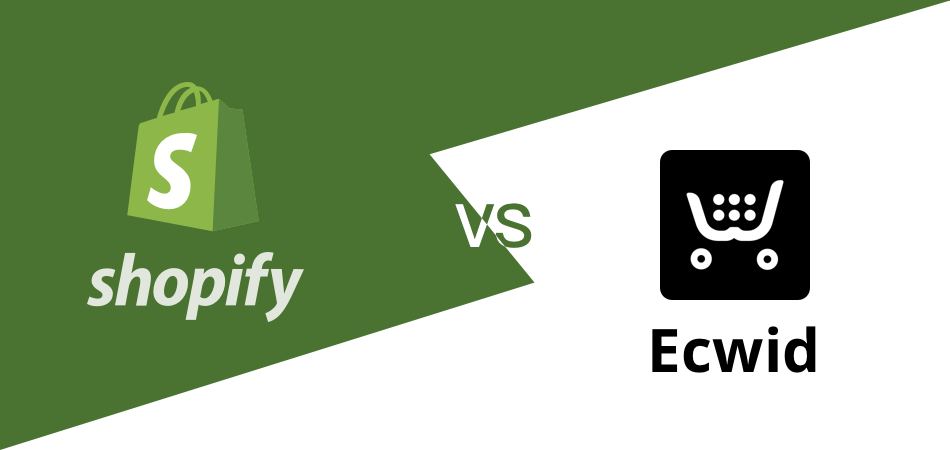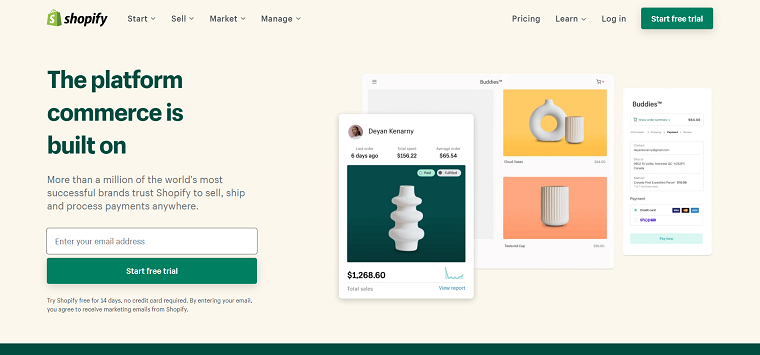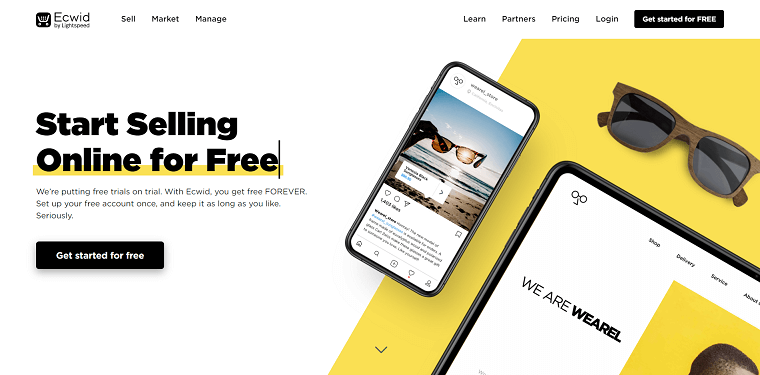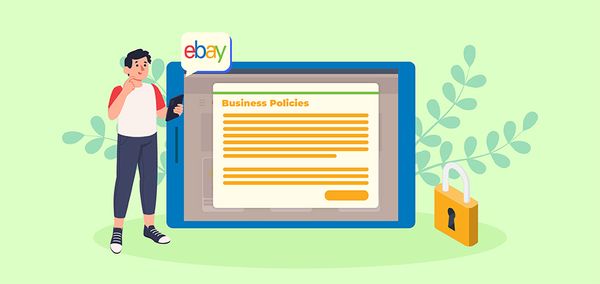Ecwid vs Shopify 2025: Which Platform Is Right for You
Last Update: Jun. 19, 2025

Starting an online store is easier than ever, even without coding experience. Two popular platforms are Shopify and Ecwid.
In this post, we'll explore the Ecwid vs Shopify dispute, comparing key features, cost, service, and more. We'll go through the advantages and cons of Ecwid and Shopify to help you determine which is best for your new e-commerce operations.
Ecwid vs Shopify: What Are They
Shopify
Shopify is a whole package, a turnkey solution for getting your online business up and operating quickly. Shopify, which was founded in 2006, now powers over 800,000 businesses and generates over $100 billion in sales for merchants.

Shopify is a whole package, a turnkey solution for getting your online business up and operating quickly. Shopify, which was founded in 2006, now powers over 800,000 businesses and generates over $100 billion in sales for merchants.
Ecwid
Ecwid is an e-commerce plugin with the primary goal of assisting small businesses in expanding their market. Ecwid is well-known for its ability to interface with any platform and successfully increase sales.

Ecwid was first introduced to the market in 2009 and has since assisted over 1 million online retailers.
Ecwid vs Shopify: Similarities & Differences
Ecwid and Shopify are popular names in the e-commerce field. They have both similarities and differences for each. Let’s check out what they are:
| Feature | Shopify | Ecwid |
|---|---|---|
| Founded | 2006 | 2009 |
| Users | Over 1 million merchants | Over 1 million merchants |
| Pricing | Starts at $29/month, no free plan (14-day trial) | Free plan (up to 10 products), paid plans from $15/month |
| Best for | Growing businesses needing full-featured stores | Small businesses or existing sites wanting simple eCommerce |
| Multi-channel sales | Supports Facebook, Instagram, POS, and more | Supports basic social media selling |
| App ecosystem | Extensive apps with deep customization | Lightweight and practical apps |
| Customer support | 24/7 support with video tutorials | Business hours support and active community |
Similarities
Basically, Shopify and Ecwid are Software as a Service (SaaS), in other words, a tool for selling stuff. Both platforms allow users without any coding knowledge to create an online store, upload products to it, and manage inventory on an ongoing basis.
In addition, there are several fundamental similarities between these two platforms:
- Payment Gateway: The software that securely handles the transactions of your customers. PayPal, Stripe, and Worldpay are just a few of the firms that provide payment gateway services. Both Ecwid and Shopify support a large number of payment gateways, with Ecwid supporting over 85 and Shopify supporting over 100.
- Purchase Button: Customers of Shopify and Ecwid may integrate a 'purchase button' into their current websites in addition to creating an online shop. Add-to-cart and checkout options are among the basic features that may be added to your website or blog.
- Built-in App Store: Both Ecwid and Shopify offer an app store that provides additional functionality and customization options for their customers. Shop design, marketing, sales and conversions, orders and shipping, inventory management, and customer service are just a few of the many categories available in both app shops, which also include dropshipping.
Differences
Choosing between Ecwid and Shopify is sometimes challenging since the two solutions are so dissimilar. Ecwid and Shopify are two completely distinct eCommerce platforms.
Overall, Shopify is the greatest all-around eCommerce builder on the market, while Ecwid is ideal for individuals who only want to add a little eCommerce flare to an existing site.
We investigated, tested, and tried both Shopify and Ecwid and created this comparison to make your business simpler and more smooth. Keep reading to review a few major differences that should be highlighted.
Ecwid vs Shopify: Product Features Comparison
Ecwid is a better option if you already have a website and are satisfied with it. You may want to look at Shopify instead. Now, let’s see whether their features are different or not!
- Product Limits: When it comes to product limits, Shopify is far more generous than Ecwid. You can literally sell an infinite amount of things without running into any problems. Ecwid's free plan allows you to access 10 products; the next one allows you to access 100, and the highest-cost plan only allows you to access infinite products.
- Product Options: With Shopify, you may create up to 3 variants for any product you sell. You may, for example, have a variety of sizes and colors. Ecwid is far more adaptable in this area. You have complete control over providing your consumers with any and all alternatives.
- Product Categories: Ecwid and Shopify both make it easy to create collections, so you can go either way in most circumstances. Shopify, on the other hand, is a little easier to operate since you can manually add products to collections and build alternatives that are automatically supplied with products depending on the criteria you provide. Ecwid allows you to spread categories out using filters, however, it isn't as intelligent as Shopify.
- Digital Products: Both Shopify and Ecwid will not limit you to selling only tangible products. You may also sell digital items such as music and eBooks. With Shopify, you can do this on any plan as long as you have the correct app. When it comes to the file sizes you may access, Ecwid has more storage. Depending on your demands, you may sell up to 25GB of files, but Shopify only offers 5GB.
Ecwid vs Shopify: Pros and Cons of Each
Like everything in the world, there are both pros and cons. The pros and cons of each tool may be one of the most important factors that help you make the right decision when choosing.
Pros of Ecwid vs Shopify
Ecwid
- An existing asset may be converted into an online shop
- Use the system you are currently familiar with to develop your website.
- Diversify your distribution methods (including social media)
- Take advantage of a user-friendly platform for novices.
- Product possibilities are unlimited.
- The mobile app for your shop is also available in 45 languages.
Shopify
- Professional-looking templates are readily available to get you up and running.
- Ample access to HTML and CSS
- Create a shop that is completely tailored to your needs.
- Ready for search engine optimization with a wide range of choices
- URLs that look good and are easy to remember
- Exceptional inventory management tools.
- a store's best assets for increasing revenue
- Mobile-optimized responsive web pages
- Shipping charges are automatically calculated for you.
Cons of Ecwid vs Shopify
Ecwid
- Design options are limited
- It's not a great place to start a new company.
- Shipping charges aren't calculated automatically.
- a basic free plan (not much functionality)
- For the time being, there are no AMP pages
Shopify
- Transaction fees may jack up the cost of goods and services significantly.
- Picking a theme restricts your options.
- For a limited time only
Read more: Shopify Review: All the Pros & Cons You Need to Know as a Dropshipper
Ecwid vs Shopify: Pricing Consideration
Pricing is also one of the most considerations for many sellers when choosing a selling platform. Let’s see the different things among the pricing of these two tools:
Ecwid
Ecwid offers a free plan and three premium ones.
- Free: $0 per month.
- Venture: $15 per month
- Business: $35 per month
- Unlimited: $99 per month
While the free plan's low cost may tempt you, the features it offers are so restricted that we don't advocate using it for lengthy periods of time. As a starting point, Ecwid's Instant Site Builder and the ability to sell up to 10 goods make it a good option.
The Venture strategy, even if it's only a little internet business, is the minimal need for a successful operation. Ecwid's App Market, inventory monitoring, multi-channel selling, and social network selling are all included in the $15 per month starting plan.
Shopify
In order to use Shopify, you must purchase one of the five premium plans that range from $9 per month to $2000 per month and have no free options. However, there is a 14-day free trial available on all Shopify plans, so you can sample before you purchase.
- Shopify Lite: $9 per month
- Basic Shopify: $29 per month
- Shopify: $79 per month
- Advanced Shopify: $299 per month
- Shopify Plus: $2000 per month
Even while Shopify's costs are higher than Ecwid's, it also offers a more comprehensive set of capabilities. Shopify's lowest $29 per month package includes product variations, inventory management, and abandoned cart recovery. Ecwid requires a minimum monthly payment of $35 in order to get access to these functionalities.
Because it provides you with everything you need to start and build a fully functional online shop, we recommend Shopify's Basic plan to the vast majority of online merchants.
Ecwid vs Shopify: Who Will Win
In reality, both methods provide unique benefits to small enterprises.
Ecwid stores may appear and perform like Shopify stores. Ecwid is for people who seek a low-maintenance, low-cost internet shop. Its restricted choices in certain areas may be beneficial to some users. Shopify is great for people who wish to spend time designing and growing their online company. In the long term, Shopify costs more than Ecwid.
Choose between Ecwid and Shopify according to your company goals. Consider your business's size, product variety, budget, and time commitment.
Ease of Use
Because both e-commerce systems provide straightforward functionality and design, there is no obvious victor in this Ecwid vs. Shopify duel.
- Ecwid's control panel is intuitive and well-designed, so you won't have to sift through a plethora of options to locate what you're looking for. It has a number of options for customizing the style of your store to suit your needs.
- Shopify's interface, on the other hand, features a drag-and-drop website builder. Shopify is simple to use while having more customization possibilities and a more sophisticated framework than Ecwid.
Online Dropshipping
Shopify takes the prize for its easy interaction with AliExpress and several possibilities for contacting other drop shippers.
| Get Started Now to Grow Your Online Business with the Best AliExpress Dropshipping Tool - DSers! |
- In fact, Shopify's marketplace has a first-party tool, like DSers, that allows you to connect with AliExpress's hundreds of product suppliers right instantly. You may also reach out to people using various applications or dropshipping directories.
- Setting up a dropshipping business on Ecwid, on the other side, takes more human labor. You may still link your website to suppliers (using Alibaba or Wholse2B, for example) and move items using third-party extensions. However, it has a smaller number of connectors than Shopify or any other dropshipping platform.
Point of Sale
Shopify comes out on top since it has POS right out of the box.
- Shopify POS Lite (basic) is included with all Shopify plans. It allows you to collect payments at physical venues such as pop-up shops, markets, and fairs. The improved Shopify POS system is available for an additional $89 per month. The POS Pro allows you to manage employee authorization and includes speedier processes and advanced inventory features.
- On the other hand, Ecwid’s POS requires integrating with third-party apps.
Customer Support
Shopify takes home the prize for giving assistance with all sorts of customer care as well as a large library of self-help materials, including video lessons on all plans.
- Ecwid's customer service choices are restricted and are determined by your package. Ecwid's free software does not have live customer assistance, however, you may utilize their blog to get ideas on how to use their plugin from other customers.
- Shopify, on the other hand, has an excellent customer support team. You can obtain near-instant solutions to your problems 24 hours a day, 7 days a week. You may also send an email if that is more convenient for you. Furthermore, the Shopify Help Center can assist you in learning how to use the platform. It has videos and instructions on every subject imaginable.
Frequently Asked Questions
Final Words
Both Ecwid and Shopify are powerful and competitive in the eCommerce sector, as seen in this comparison between them. But each has its own unique characteristics and objectives.
With different plan choices for scaling big volume traffic, Shopify seems to outperform Ecwid when it comes to selling on a wider scale and supporting growth. Ecwid, on the other hand, is sensitive to the demands of micro-enterprises. Shopify offers a 14-day free trial if you want to give it a go but aren't convinced.
If you know exactly what you want to accomplish with your company, you will be able to discover the best platform for you. I wish you the best of luck with your projects!













 Company
Company
 Why Choose DSers
Why Choose DSers
 Blog
Blog
 Help Center
Help Center




 Live Chat
Live Chat